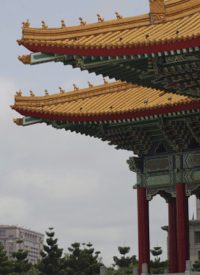
Among those indicators were electricity consumption (flat), car sales (flat), property prices (collapsing), and industrial orders (down). And there is more to come, much more. The Chinese communist government is slowing the rate of growth of the money supply in order to “fight inflation,” the natural result of nearly 30 years of expanding that money supply in order to catapult the Chinese agrarian economy into the 21st century. And such slowing is having the same expected effect: As the economy slows down, bankruptcies increase, tax revenues decrease, and the economy slows down further.
Chang added, “We’ll see more obvious signs of deterioration in the Chinese economy over the next six months.” He noted that one of those signs is the increasing civil unrest including riots, bombings, and insurrections taking place across the country.
Entrepreneurs in China who have gotten rich by exploiting the government-fed demands to build cities and infrastructure to house the coming wave of residents are now getting out of China while the getting is good. Back in June Forbes magazine wrote that 60 percent of China’s high-net-worth individuals are either considering emigration or have already left the mainland for safer havens elsewhere. Global Financial Integrity estimates that the sums of money that have already left the country are huge, exceeding $2 trillion dollars through 2008. Such a financial exodus has naturally been criticized by the Chinese government. Writing in the communist newspaper Global Times, Zhong Dajun protested, “We have been working hard to develop the economy in the past 30 years, but now these elite members of society are fleeing with the majority of the wealth.”
It’s the financing of those efforts to “develop the economy” that is the problem. The Chinese government’s plan to move 350 million people from rural areas into cities required building those cities in advance. Here was their perfect opportunity to use the Keynesian approach to create wealth out of paper: The government set up 10,000 investment companies to build them, and provided financing through banks funded by the government. It would put people to work, stimulate the economy, and “provide for the common good” on communist terms. It was also designed to foster a change in the economy from rural to a demand-driven consumer society. It was “jump-starting” to a degree never seen in history — “pump-priming” to push the economy ahead.
The pending implosion is the natural result of such efforts. Twenty new cities were being built every year, but few citizens were moving into them. “Ghost cities” they were called, and thanks to Time magazine’s photographer, Michael Christopher Brown, pictures of them can be seen here and here and of empty apartment buildings here.
China’s failed attempt at building a Disneyland for the World, called “Wonderland,” which now lies in ruins just outside Beijing, can be seen here.
Patrick Chovanec is a professor at Tsinghua University in Beijing and regularly brings on-the-ground commentary via his website on China’s increasingly visible economic meltdown. He noted the first signs appearing in August when the top developers reported having difficulty selling their inventories, and consequently having to severely cut their selling prices for apartments and office buildings. This outraged citizens, who took to the streets to demand refunds on properties they had purchased prior to the fire sales. Chovanec lists 10 cities where developers have already slashed their prices in order to raise cash to meet demands from their lenders. And some of those lenders are “off the books” with unique enforcement procedures available to them for collection purposes.
Chovanec reports that prices are dropping in 57 of the top 100 cities in China and that in Beijing home prices dropped by an astounding 35 percent in one month. He quoted Business China in noting that in November in the city of Tianjin, the sixth largest city in the country, with 13 million people, “housing transactions shrank 57% y-o-y” while in Changsha, a city of 7 million, housing “activity dropped 79% from a year earlier.” Chovanec reported that he is hearing stories of serious financial difficulties facing the builders and even of some suicides.
The bills are coming due for those developers who owe gargantuan sums to local banks. The top 115 builders are suffering cash flow problems to the tune of nearly $21 billion, with loans that must be paid off or rolled over next year, much of it by the end of March. Real estate agencies are closing, and agents owed commissions for previous sales are having to wait six months to get paid.
Chovanec points out that what has happened is the change from greed to fear that has been almost instantaneous:
What this suggests to me is that the earlier dynamic — where prospective homeowners were desperate to buy at any price, for fear that prices would rise — has now changed, and even non-speculative buyers are adopting a wait-and-see approach, which undermines demand just as developers are becoming desperate to sell, creating a spiral of downward expectations.
What Professor Chovanec is describing is the popping of a bubble — that moment in time when expectations change suddenly — as at the top of a roller coaster just before the plunge into oblivion.
In the United States the real estate bubble was blown up with paper money financing totaling approximately 50 percent of the country’s GDP. In China, the total paper money financing, on- and off-book, totals about 200 percent of that country’s GDP. The popping of the China bubble will be heard ‘round the world.



